|
|
|
Sort Order |
|
|
|
Items / Page
|
|
|
|
|
|
|
| Srl | Item |
| 1 |
ID:
129344
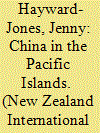

|
|
|
| 2 |
ID:
112546
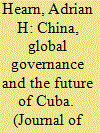

|
|
|
|
|
| Publication |
2012.
|
| Summary/Abstract |
China's deepening engagement with Latin America has been accompanied by concerns about the Chinese government's regard for international conventions of economic governance. Critics claim that across Latin America and the Caribbean, Chinese aid and trade are characterised by excessive state intervention. This article argues that, for two reasons, the rationale for these misgivings is dissipating. First, since the onset of the global financial crisis, China has gained influence in multilateral institutions, prompting them toward greater acceptance of public spending in developing countries. Second, recent developments in Cuba show that China is actively encouraging the Western hemisphere's only communist country to liberalise its economy. China sits at the crossroads of these local and global developments, prompting Cuba toward rapprochement with international norms even as it works to reform them.
|
|
|
|
|
|
|
|
|
|
|
|
|
|
|
|
| 3 |
ID:
120192
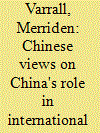

|
|
|
|
|
| Publication |
2013.
|
| Summary/Abstract |
China's increasing role as a provider of overseas aid is the subject of considerable debate both within and outside of China. However, despite research activity examining how Chinese aid is materialised, very little is actually known about why Chinese aid projects are developed or implemented the way they are. Although recent indications suggest the Chinese government is increasingly willing to be more open about overseas aid, for example, the release of the first White Paper on Foreign Aid in 2011, external observers remain largely unaware of the values, goals and motivations behind Chinese aid projects. Alongside this lack of information, non-Chinese analyses tend to be founded on a Realist approach to understanding international relations in which a 'rising power' such as China automatically constitutes a threat to existing power relations. As a result, many scholars conclude that China's aid is part of a strategic quest to further its own geopolitical ends. This paper provides insights into the contentious topic of the drivers behind Chinese overseas development assistance. It finds that Chinese elites in the international development sphere do not share the views prevalent in Western international relations discourse about the international system and China's role within it. This article argues that exploring Chinese development actors' and commentators' conceptions of what development means, along with their views on China's role and obligations within the international system, allows a better understanding of the motivations behind Chinese aid, and a re-examination of some of the misconceptions around Chinese aid as a tool of Chinese geopolitical strategy.
|
|
|
|
|
|
|
|
|
|
|
|
|
|
|
|
| 4 |
ID:
143629
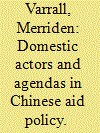

|
|
|
|
|
| Summary/Abstract |
As China's aid has increased, so has scrutiny by the international development and foreign policy community. Despite recognition that foreign aid policy is a result of domestic political contests, the existing literature tends to overlook Chinese debates about the purpose of aid, and how that purpose should be achieved. This paper argues that examining these debates shows that Chinese aid is not a well-considered element of an overarching strategy. Rather, where foreign aid is considered relevant vis-à-vis China's goals, its use is hotly contested. Competing actors' varying agendas, rather than any coherent strategy, underpin inchoate aid projects.
|
|
|
|
|
|
|
|
|
|
|
|
|
|
|
|
| 5 |
ID:
145405
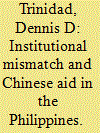

|
|
|
|
|
| Summary/Abstract |
Why is Chinese aid attractive to some recipient countries and controversial in others? This study advances the idea that Chinese aid is more attractive in countries that lack or have weak Development Assistance Committee–based aid institutions. When there is a mismatch between a non-DAC donor and a recipient country's aid regimes, legal and political problems may arise, as the case of Chinese aid to the Philippines in the 2000s demonstrates. As a recipient country, the Philippines is more accustomed to DAC-based rules and practices governing development aid processes, while as a donor country, China's aid institutions evolved outside the DAC club. The controversies that subsequently arose from institutional mismatch created a public perception that Chinese aid was illegal and prone to corruption, undermining China's aid objectives.
|
|
|
|
|
|
|
|
|
|
|
|
|
|
|
|
| 6 |
ID:
164764


|
|
|
|
|
| Summary/Abstract |
Beijing’s ambitious Belt and Road Initiative (BRI) has exacerbated a longstanding concern about the power shift from the West to China. The existing debate, however, is both motivated by, and fixated on, the strategic concerns of and about great powers (and to a lesser extent, middle powers). What is often overlooked is the concerns and voices of smaller countries and contested regions where some of the power-shift symptoms allegedly unfold, such as the South Pacific. To traditional donors such as Australia, the power dynamism in the South Pacific is largely a linear, two-way model of power shift from Western donors to Beijing. Challenging this model, this article proposes a complex, three-way model to bring small and seemingly passive actors into the power shift equation. To illustrate, the article uses Papua New Guinea’s (PNG) perceptions of China’s aid vis-à-vis Australia’s aid as a case study. Relying mostly on primary (interview) sources, this study not only reveals some nuanced attitudes of local actors toward the great-power interactions, but also highlights the hitherto neglected role and agency of Pacific Island nations and their domestic politics in the inherently complex power shifts.
|
|
|
|
|
|
|
|
|
|
|
|
|
|
|
|
| 7 |
ID:
110072
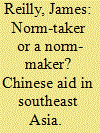

|
|
|
|
|
| Publication |
2012.
|
| Summary/Abstract |
As China expands its development assistance in Southeast Asia, is Chinese aid beginning to emulate international norms and practices or sustaining its own distinct approach to development assistance? This essay argues that China's socialization into international norms varies with the thickness of the institutional environment. In Laos and Cambodia, China's enhanced collaboration with international consortia, improved transparency, and project diversity point to nascent socialization. China's aid to Myanmar, however, remains opaque and largely self-interested. At the regional level, Beijing is bolstering its influence over the norms and practices of regional developmental institutions.
|
|
|
|
|
|
|
|
|
|
|
|
|
|
|
|
|
|
|
|
|